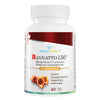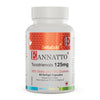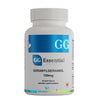If you're wondering: should I take a multivitamin? you're not alone. Many people consider taking supplements to help boost their overall health and well-being. In this blog, we'll explore the potential benefits and side effects of multivitamins, as well as the importance of multivitamins in getting the right daily vitamin intake.
We'll also offer guidance on choosing the best multivitamin for your individual needs. Whether you're looking to fill nutrient gaps in your diet, support a specific health condition, or simply want to ensure optimal health, we'll provide the information you need to make an informed decision on the most frequent question: Should I take a multivitamin or not?
Key Takeaways
- To understand this: Should I take a multivitamin? First, understand multivitamins can help fill nutrient gaps in your diet.
- It's important to be aware of potential side effects and dosage recommendations.
- Choosing the right multivitamin for your individual needs is crucial.
- Supplementation should not replace a balanced diet.
- Checking with your healthcare provider before taking a supplement is recommended.
Understanding Multivitamin Benefits
Multivitamins can be a helpful addition to a healthy lifestyle, providing essential nutrients that may not be obtained through diet alone. They can help fill nutrient gaps and contribute to overall health and well-being.
A multivitamin can help ensure you are meeting your daily vitamin and mineral needs, which is especially important if you have specific dietary restrictions or a busy lifestyle. Research suggests that multivitamins may also provide benefits such as:
- Improved immune function
- Increased energy and vitality
- Reduced risk of chronic disease
- Improved cognitive function
However, it's important to note that multivitamins are not a replacement for a balanced diet and healthy lifestyle. They should be used in conjunction with a nutritious diet and regular exercise.
The recommended daily intake of vitamins and minerals varies depending on age, gender, and other factors. Multivitamins can help ensure you are meeting these recommended daily amounts. However, it's important to consult with a healthcare provider before starting any new supplement regimen.
Exploring Potential Multivitamin Side Effects
While multivitamins are generally safe to consume, there are some potential side effects to consider. Some people may experience an upset stomach or nausea after taking a multivitamin, especially if it is on an empty stomach. To avoid this, try taking your multivitamin with food or before bed.
In addition, some ingredients in multivitamins can interact with medications or have adverse effects in large doses. For example, high levels of vitamin A can cause birth defects in pregnant women, while high doses of iron can be toxic if consumed over a prolonged period.
It's important to talk to your healthcare provider before starting any new vitamin regimen, especially if you're currently taking medication or have any pre-existing health conditions.
To minimize the risk of side effects, it's crucial to follow the recommended dosage instructions on the packaging. Taking more than the recommended amount of a specific vitamin or mineral can lead to unwanted side effects and may even be dangerous in some cases.
Overall, it's important to weigh the potential benefits of multivitamin supplements against the potential risks. By staying informed about the ingredients and dosage of your multivitamin, you can ensure that you're taking it safely and effectively.
Importance of Choosing the Right Multivitamin
Choosing the right multivitamin is crucial for maintaining optimal health. There are several factors to consider when selecting a multivitamin, including age, gender, and specific health conditions.
For example, women may require additional iron in their multivitamins to support their menstrual cycle, while men may benefit from extra zinc for prostate health. Additionally, those with dietary restrictions or food allergies may need to choose a multivitamin that is free of certain ingredients.
It's important to look for a multivitamin that provides essential vitamins and minerals, such as vitamin D, calcium, and magnesium. These nutrients are vital for maintaining healthy bones, immune function, and overall wellness.
The best multivitamin for overall health is one that is tailored to your individual needs and provides all the necessary nutrients to support your body. Look for a reputable brand with a proven track record of producing high-quality supplements.
Remember, multivitamins should be viewed as a supplement to a healthy diet, not a replacement. Always consult with your doctor before starting any new supplement regimen.
Multivitamins for Specific Needs
Multivitamins are not one-size-fits-all, and they can be tailored to meet specific health needs and goals. For pregnant women, prenatal multivitamins are designed to support fetal development and ensure proper nutrition for both the mother and the baby.
Athletes may benefit from multivitamins that include additional B-vitamins for energy production and vitamin D for bone health.
Immune support multivitamins can include higher doses of vitamins C and E, as well as zinc and selenium, which can help boost the body's natural defense mechanisms. Multivitamins can also be formulated for different age groups, with higher levels of calcium and vitamin D for bone health in older adults, for example.
Consulting with a healthcare provider or registered dietitian can help determine which multivitamin would be best suited for specific needs and health goals. It's important to follow the recommended dosage guidelines and choose a reputable brand for optimal safety and efficacy.
Conclusion
Overall, taking a multivitamin can be a helpful way to ensure you meet your recommended daily intake of vitamins and minerals. While it's always best to obtain nutrients through whole foods, some individuals may require additional supplementation to achieve optimal health.
When selecting a multivitamin, it's important to consider your individual needs and choose a formulation that aligns with your age, gender, and health conditions. Additionally, be sure to follow dosage instructions carefully and consult with a healthcare provider if you have any concerns or questions.
Remember, multivitamin supplements should always be used in conjunction with a healthy diet and lifestyle. By focusing on nutrient-dense foods and incorporating regular physical activity into your routine, you can support your overall health and well-being.
FAQs
Should I take a multivitamin?
Answer: Whether to take a multivitamin depends on your individual needs and diet. They can be beneficial for filling nutrient gaps or addressing specific health conditions. Consult your healthcare provider for personalized advice.
What are the benefits of multivitamins?
Answer: Multivitamins fill nutrient gaps, support overall health, and ensure optimal bodily functions by providing essential vitamins and minerals that may be lacking in your diet.
Are there any side effects of taking multivitamins?
Answer: While generally safe, potential side effects include upset stomach, nausea, constipation, or allergic reactions. Follow the recommended dosage and consult with your healthcare provider if needed.
How do I choose the right multivitamin?
Answer: Consider factors like age, gender, health conditions, and specific needs. Look for a reputable brand that meets quality standards and provides nutrients tailored to your requirements.
Are there multivitamins for specific needs?
Answer: Yes, specialized multivitamins cater to needs like pregnancy, athletic performance, or immune support. Consult healthcare professionals to determine if a specialized multivitamin is necessary.
What is the recommended daily intake of vitamins and minerals?
Answer: Recommended intake varies based on factors like age and gender. Follow established guidelines or seek advice from healthcare professionals for personalized recommendations.
Should I take a multivitamin supplement?
Answer: Yes, multivitamin supplements can complement your diet, but they should not replace a balanced diet. Use them to supplement a healthy lifestyle and consult with your healthcare provider before starting any new regimen.











